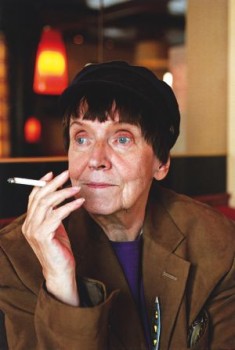Tag: poetry
Bonfires in the garden
6 March 2014 | Fiction, poetry
Poems from Inga stjärnor i natt, sir (‘No stars tonight, Sir’, Schildts & Söderströms, 2012). Introduction by Jukka Koskelainen
With us on the cruise was
an old, old man.
We wondered what
he was doing there.
He sat at a table by himself.
Silent. Drinking water.
Never turned up at the cabaret
or the ballroom.
Once he asked the receptionist,
rumour had it, if it was possible
to go out into the fresh air,
there beneath the stars.
‘No stars tonight, sir!’
said the man in the hatch.
The old man wasn’t seen again
until we reached land.
Wonder what happened to him.
Not that it’s any of our business.
![]()
Eerikinkronikka [Eric’s Chronicle]
6 March 2014 | Mini reviews, Reviews
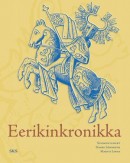 Eerikinkronikka
Eerikinkronikka
[Eric’s Chronicle]
Finnish translation by Harry Lönnroth, Martti Linna
Helsinki: Suomalaisen Kirjallisuuden Seura [Finnish Literature Society], 2013. 221pp.
ISBN 978-952-222-445-3
€35, hardback
Eerikinkronikka (Erikskrönikan) is both an important source of knowledge about Finland’s medieval history and a chivalric epic poem. The Old Swedish text was possibly written during the 1320s by Duke Eric’s secretary, the priest Torkel Kristinsson. Philologist Harry Lönnroth and historian Martti Linna have translated the work into Finnish for the first time, in prose form, with an extensive introduction by Lönnroth. The epic depicts the political history of Sweden in the 13th and 14th centuries, and also the struggle for power within the family of the well-known statesman Birger Jarl (died 1266). One of the central characters is the idealised Duke Eric (died c.1318), whose son becomes King Magnus Eriksson. The narrator comments on events in a laconic style that often has a religious tinge. The epic gives a vivid and dramatic account of chivalric life and life in the kingdom of Sweden, of which Finland was a part. At the time the Swedes were consolidating their power in Finland; the work mentions Birger’s ‘crusade ‘ to Häme in southern Finland, the founding of Häme Castle, and battles in Karelia.
Translated by David McDuff
Verse and freedom
16 January 2014 | Articles, Non-fiction
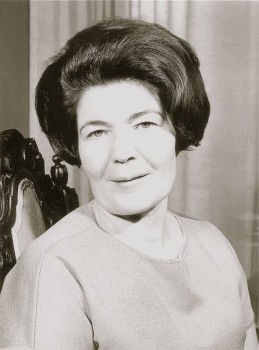
Aale Tynni (1913–1997). Photo: WSOY
Finnish poetic modernism, which with its freedom of rhythm came to dominate the literary mainstream of the 1950s, posed a particular challenge to the poets of the classical metrical and romantic poetic tradition. Aale Tynni (1913–1997) is not a poet of any one school or form, but rhythm is the deepest foundation of her poems, whether expressed in metre, free verse or the speech rhythms that characterise some of her poems of the 1950s and 60s, as well as those of her final years.
An Ingrian Finn, Tynni left Ingermanland near Petersburg for Finland as a refugee after the First World War, in 1919. The war and the period of uncertainty that followed it are present in her poems as an allegory, sometimes appearing as a dance of death or a carnival. At other times they emerge in the myth of Phaethon, who with his sun chariot is in danger of throwing Mother Earth off her axis, or as a game of chess in which God and the angel Gabriel play with the planets and moons as pieces. The poet makes use of mythic and cosmic references to widen her scope and to portray Man in the stages of history and the present age. More…
Air, blue and gold
16 January 2014 | Fiction, poetry
Poems. Introduction by Tuula Hökkä
The arch bridge
From Ylitse vuoren lasisen (‘Over the glass mountain’, 1949)
And God said: to others I’ll give other tasks, but the task I’ll give to you
is to make a curving bridge, my child, with an arch that’s round and true.
For everywhere around the earth human beings are laden with gloom,
and they’ll come to cross an arching bridge in their anguish and their doom.
Make a bridge that spans the precipice, a bridge over the abyss,
one that shines to my glory with radiance, sparkling like this.
I said: They will come with heavy boots, and heels caked with clay –
how can my bridge withstand their weight, yet also shine this way,
not tarnish or break apart as their crowding presence nears?
And God said: well, it can only be done by means of blood and tears.
Your heart is stronger than mountain rock, the ore that’s buried there –
Put a piece of it into the bridge support, and you’ll get the bridge to bear.
Add a piece of the hearts of those you love, and I know they won’t condemn,
but will surely grant you forgiveness if you make a bridge for them.
Make a bridge to the glory of God, my child, make a bridge with arching light
that will span the depths and shine for ever, with radiance sparkling bright.
Don’t lock the sorrow out of your heart as the bridge you make appears.
Nothing gleams more beautifully than the brilliance of pure tears. More…
Mikko-Olavi Seppälä & Riitta Seppälä: Aale Tynni. Hymyily, kyynel, laulu [Aale Tynni. A smile, a tear, a song]
16 January 2014 | Mini reviews, Reviews
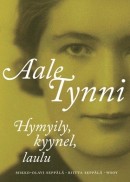 Aale Tynni. Hymyily, kyynel, laulu
Aale Tynni. Hymyily, kyynel, laulu
[Aale Tynni. A smile, a tear, a song]
Helsinki: WSOY, 2013. 488 pp., ill.
ISBN 978-951-0-38306-3
€37, hardback
The poet, author and translator Aale Tynni (1913–1997), an Ingrian Finn who came to Finland as a refugee after the First World War in 1919, published 15 collections of poetry between 1938 and 1987. Among her translations are works by Ibsen, Shakespeare, Yeats and Racine. This extensive biography, compiled and written by Tynni’s daughter Riitta Seppälä and her grandson, historian Mikko-Olavi Seppälä, is an in-depth, lively portrait of a poet who, in her time, was both admired and criticised for her choices of form and content. Tynni felt that classical metrical tradition was closest to her, and patriotism was one of her themes; however, in the postwar years the freedom of rhythm of Finnish modernism began to flourish, and politics also gained strength in the literary world. In 1948 Tynni won the gold medal for literature in the – rather bizarre and short-lived – art competitions at the Summer Olympics in London with her poem ‘Laurel of Hellas’. Tynni experienced dramatic turns in her personal life; she underwent a prolonged divorce from her first husband who bitterly fought it. Two of her three children committed suicide in adulthood. She was finally free to marry the widowed poet Martti Haavio (aka P. Mustapää) in 1960, a marriage of soulmates that lasted until Haavio’s death in 1973.
Ecstasy rewarded
28 November 2013 | In the news
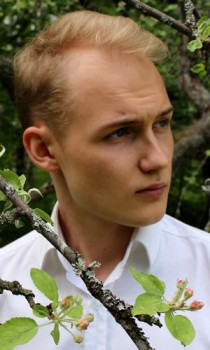
Erkka Filander. Photo: Virpi Alanen
On 14 November Helsingin Sanomat Literature Prize, the Helsinki newspaper’s prize for the best first work of the year, worth €15,000, was awarded for the 19th time.
The jury made its choice from 90 first works, and this time the prize was awarded to a youngest writer ever, the poet Erkka Filander (born 1993), for his collection Heräämisen valkea myrsky (‘The white storm of awakening’; available as a pdf at the home page of the publisher, Poesia).
According to the jury, this poetry is ‘ecstatic poetry, pulsing with the joy of living… there is no place in Filander’s poetry for cynicism or irony. Thus his writing appears, in the context of contemporary poetry, exceptionally open and sincere.’
A family affair
24 October 2013 | In the news
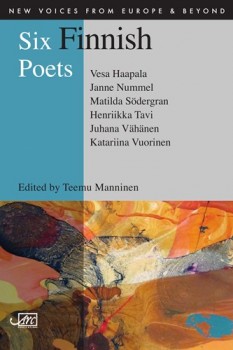 Six Finnish poets, edited by Teemu Manninen – a poet himself – is the tenth volume in a series of bilingual anthologies bringing contemporary poetry from around Europe to English-language readers.
Six Finnish poets, edited by Teemu Manninen – a poet himself – is the tenth volume in a series of bilingual anthologies bringing contemporary poetry from around Europe to English-language readers.
One of the poets introduced is a Finland-Swede, Matilda Södergran, whose poems are presented in their original Swedish alongside the English translations. The other poets, all of whom write in Finnish, are Vesa Haapala, Janne Nummela, Henriikka Tavi, Katariina Vuorinen and Juhana Vähänen. Their translators are Emily & Fleur Jeremiah, Lola Rogers and Helen R. Boultrum.
In his introduction Teemu Manninen briefly outlines the developments of contemporary Finnish poetry around the turn of the 21st century. The poets chosen were born in the 1970s and 1980s; their work could be characterised variously as experimental, surrealist, minimalist and ironic.
According to Manninen, during the last couple of decades, a ‘do-it-yourself’ culture has sprung up among people interested in performing poetry, organising independent festivals and clubs, and disseminating their work via the Internet. New, cheaper methods of publishing printed books have also contributed to a growing interest in poetry and to its popularity. Even so, contemporary poetry is not something that attracts large crowds; people involved in this sort of ‘literary activism’ tend to know each other well.
So, ‘in Finland, poetry is a family affair,’ notes Manninen. ‘The familial communality has to be acknowledged if one is to understand the kind of poetry currently being written in Finland….’ It mostly lives and thrives independent of large publishers, newspapers and literary prizes.
The anthology series is entitled New Voices from Europe and Beyond; it is published in the UK by Arc Publications in co-operation with Literature Across Frontiers.
That which simply is
24 October 2013 | Non-fiction, Reviews
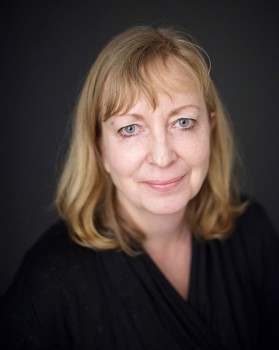
Henrika Ringbom. Photo: Curt Richter
Henrika Ringbom
Öar i ett hav som strömmar
[Islands in a flowing sea]
Helsingfors: Schildts & Söderströms, 2013. 78 p.
ISBN 978-951-52-3218-2
€21, paperback
Henrika Ringbom’s new collection of poems is emotionally touching and formally sophisticated – something only the very best poetry can manage. Ringbom is an experienced author whose output since her debut in 1988 has included five collections of poetry and two novels; even so, it feels as if she has taken another step forward in her writing with this latest volume.
The focal point is the loss of a beloved mother. The title, which translates as ‘Islands in a flowing sea’, emphasises the fleeting nature of all life, and the book radiates sorrow more than anything else. There has always been an intellectual, distancing quality to Ringbom’s writing. That stands her in good stead here, preventing the book from becoming too private and introverted, despite its highly personal themes. More…
A fleeting scent
24 October 2013 | Fiction, poetry
Poems from Öar i ett hav som strömmar (‘Islands in a flowing sea’, Schildts and Söderströms, 2013). Introduction by Michel Ekman
A fig wasp’s life
She squeezes in. The opening closes and the world overflows. She swims in the sweet flowing moisture. In the sycamore fig tree, a myriad of delicate white blossoms have burst out. For her eyes alone, a damp garden, alabaster-clear. The home she’s been longing for. There she lays her eggs, empties her pouches. Tiny little pollen grains for the tiny little blossoms. Membranes form round the eggs, they live off the sweetness, it rocks them gently. Fine, frail swaying thicket of embryos More…
It’s four o’clock and the dog is puzzled
26 September 2013 | This 'n' that
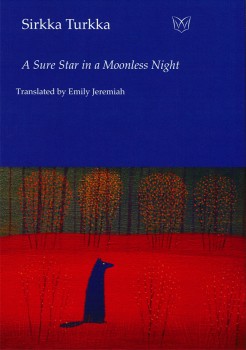
Cover image: ‘Autumn reflections’ by author and painter Saara Tikka
Apart from writing poetry for forty years, Sirkka Turkka has worked as a stable master and as a librarian – and she is a wizard in creating portraits of dogs in her poems.
‘Something kept me awake late. Something woke me up early. It’s four o’clock and the dog is puzzled. He tries to continue his dream: he was just about to catch a squirrel he barked at all of yesterday. He leaves me quite alone in silence, in which not a single breeze stirs. What is in the past ceases to be, what is to come has no significance. There is only the sun, just about to come up. And the calm surface of the lake and the coffee cup, from which leisurely steam rises.’ (From Minä se olen [‘It’s me’], 1973)
Elk, horse, raven, reindeer, jackdaw, fox. Turkka’s universe is populated with creatures, often wiser than man: man may have lost his heart, or ‘he thinks it’s a distant land’, but ‘in dogs the heart is where it should be: just after the muzzle, boulder-like, baby-faced and willing.’ (From Yö aukeaa kuin vilja [‘The night opens like corn’], 1978).
Emily Jeremiah, scholar and translator (her work includes poems by Eeva-Liisa Manner, novels by Asko Sahlberg and Kristina Carlson), found Turkka’s creatures a while ago, and as a result a selection of Turkka’s poems, entitled A Sure Star in a Moonless Night, was published recently by Waterloo Press (UK).
Melancholy: it does go well with autumn, doesn’t it? ‘Once more the stars are like a tearful ballad, and always in the evenings / the dogs tune their cracked violins.’ (From Mies joka rakasti vaimoaan liikaa [‘The man who loved his wife too much’, 1979])
Speaking with silence
26 September 2013 | Reviews
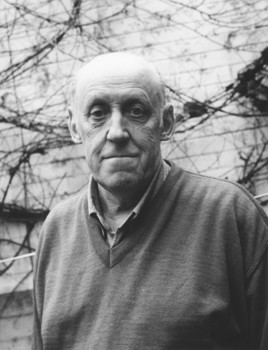
Bo Carpelan. Photo: Charlotta Boucht / Schildts & Söderströms
Bo Carpelan
Mot natten
[Towards the night. Poems 2010]
Helsinki: Schildts & Söderströms, 2013. 69 p.
ISBN 978-951-52-32-20-5
€21, paperback
‘Don’t change, grow deeper ,’ wrote Bo Carpelan: over the years he broadened his poetic range and his personal idiom evolved, but it happened organically, without sudden upheavals of style or idea.
Mot natten (‘Towards the night’) is Carpelan’s last collection of poems. This is underlined by the book’s subtitle, Poems 2010. By then Carpelan (1926–2011) was already marked by the illness that took his life in early 2011. It doesn’t show in the quality of the poems, but knowing it may make it harder for the reader to approach them with unclouded eyes. When a great poet concludes his work one wants to seek a synthesis or a concluding message, and that may encumber one’s reading. So is there such a message? In some ways there is, but Carpelan was not a man of pointed formulations. His ideals emerged without much fuss. More…
Solid, intangible
26 September 2013 | Fiction, poetry
Poems from Mot natten. Dikter 2010 (‘Towards the night. Poems 2010’, Schildts & Söderströms, 2013). Introduction by Michel Ekman
Memory
If you give me time
I don’t weigh it in my hand:
it’s so light, so transparent
and heavy as the thick
shining darkness
in the backyard gateway
to memory
Night of the Living….
5 September 2013 | In the news
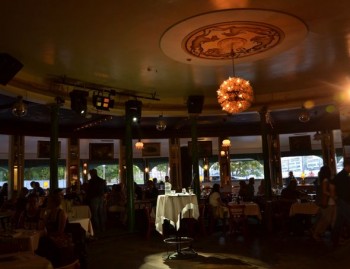
Poetry in focus: Kaisaniemi Restaurant, Helsinki, 24 August. Photo: Irene Dimitropoulos
…Poets was the main event of the annual literature festival Runokuu, Poetry Moon, taking place on 24 August in a Helsinki restaurant. The theme was the sea: the invited guests were from around the Baltic Sea – as well as beyond.
The Poetry Moon festival is organised by Nuoren Voiman Liitto and Helsinki Festival, now for the ninth time, with more than 30 events taking place in the city between 22 and 28 August.
‘In four hours writers and languages kept changing fast,’ reports Irene Dimitropoulos, an intern at FILI (Finnish Literature Exchange): ‘You had to throw yourself into the rhythms and sounds of languages both familiar and strange.
‘The programme contained lots of poetry, but the short story and non-fiction were also included. The idea of the literary evenings is to meet with writers from abroad and also to support translated foreign poetry, as very little gets translated into Finnish, so translators perform with poets.
‘The stylistic and thematic variations of different generations of writers were introduced in many ways. A translation of I Am Going to Clone Myself Then Kill the Clone and Eat It [2009/2012] by the American poet Sam Pink was published in Finnish earlier this year: his style, both simple and strikingly comical, and the way he depicts everyday experiences and the violent fantasies they invoke, made the audience laugh. Crowds were also drawn to listen to the Finnish novelist Monika Fagerholm and the German poet and translator Ulrike Draesner; Fagerholm read from her book of lyrical essays on the sea, Draesner her poems dealing with womanhood and the interaction between language and body.’
Among the other poets were Peeter Sauter and Maarja Kangro from Estonia, Igor Belov and Irina Maksimova from Russia and Toh Hsien Min from Singapore.
Writing silence
6 June 2013 | Fiction, poetry, Reviews
In contemporary poetry the ‘lyric I’ of previous decades often hides behind language; the poem’s speaker is not the poet him/herself, narrative is not the norm. The website of a Finnish family magazine in 2007 discussed this: ‘OMG, this thing called contemporary poetry – crap!’; ‘Who knows what kind of psychopharma the writer’s on!’; ‘No meanings, just words one after the other. Why can’t people write something sensible?’ But the writer – and the reader – of contemporary poetry deliberately ventures onto the boundaries of language, and art requires readers (listeners, viewers) to make the decision of what they consider ‘sensible’. Mervi Kantokorpi explores and interprets two new collections of poetry
I read two of this spring’s new collections of poetry one after the other: Kivirivit (‘Stone lines’, Otava 2013) by Harry Salmenniemi and Pysty hiljaisuus (‘Vertical silence’, Teos 2013) by Miia Toivio. The experience was perplexing.
These two works are completely different from one another as regards their individual poetics, and yet the similarities between the themes that arise from them was arresting. Both works seem to inhabit an internal world of sorrow and depression, a world where the function of poetry is to forge and show its readers a path out of the anxiety. In their silence – and even emptiness – both collections have two faces: one lit up, the other darkened by grief. More…

